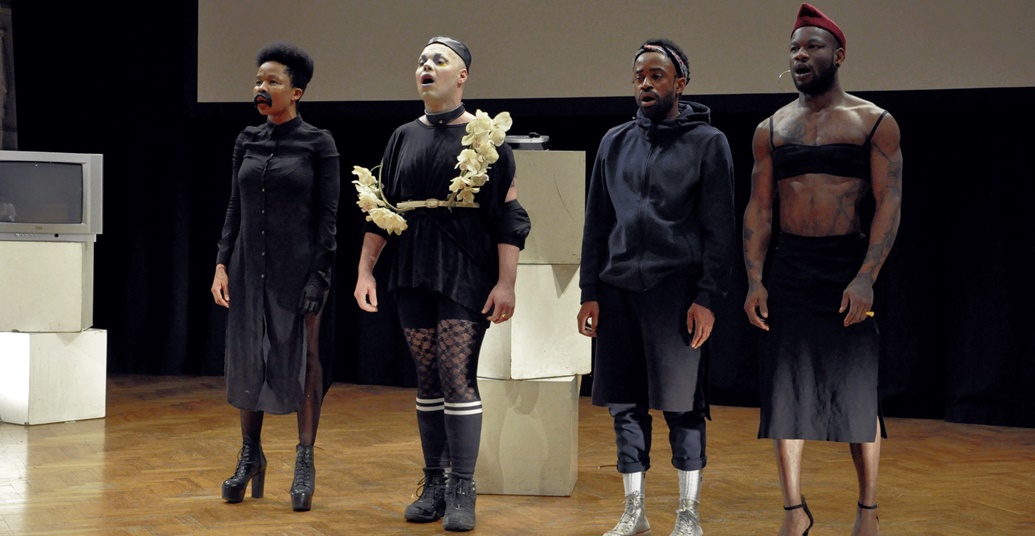The “Permanente Beunruhigung (Permanent Disturbance)” Festival opens on Friday evening with “Your Devices”. With it, Ballhaus Naunynstraße celebrates 10 years of post-migration theater, aesthetics, and cultural diversity, and the courage to show perspectives beyond the mainstream discourse.
Fleeing forward
In light of theevermore glaring societal breaches: the strengthening of right-wing andconservative powers in Europe and worldwide, the threat to marginalized groups, the schisms in society, the Ballhaus, as per usual, is showcasing artisticperspectives that shift the focus back on to the worlds of queerness, feminism, Black Lives Matter, diaspora, among others. One thing is clear: retreat is not an option. And so, “disturbance” is simply transformed into an artistic motor. The works shown during the festival are all dedicated to one not exactly simple point of departure: the pieces emerge in new, previously unknown constellations of the more than 23 artists. They meet in the absence of dramaturgs or other outsiders to debate: “What is bothering us?” Or are they rehearsing for the revolution?
The festival functions like a movement lab: two rehearsal days, on the third and fourth day there’s a performance. In this respect, there are also connections between artistic and political strategies. Intimacy, trust, standing by one another, finding a mutual language: what will be said and how (in this short interval of time)? Not least of all, prevailing understandings of art and creation are also somewhat rattled – of course no “complete” piece can be developed in two days. As a result of the “permanent disturbance”, perhaps new guns will have to be hauled out.
“Thank you for your cooperation!”
The opening piece, “Your Devices” (a two-day continued development from its first showing in 2017), by a performance quartet featuring Bishop Black, Fritz Helder, Mmakgosi Kgabi, and Dusty Whistles, starts by asking the audience for a special favor: at the beginning of the piece, after we were seriously requested to first leave our mobile phones switched on and then to turn the volume up as loud as possible, individual “devices” were immediately removed upon request when entering the theater space. Participation as a contribution – and since our mobile phones are an extension of ourselves, there is already a lot at play here. In general, the entire initial image of the performance seems like a big, colorful whirlwind. A festive atmosphere in glittery costumes, rose petals fall from the ceiling amid balloons and trash bags, someone belts out an aria, a table covered with fruit stands in the back corridor – the chaos is perfect. On two sides there are giant screens where YouTube clips with no recognizable connection are permanently streaming. The flood of images tags along as a constant companion, alarming and vacuous, and is hard to shut out – and over and over again, something rings in the rows of the audience and on stage, and interrupts the happening. Permanent disturbances.
Between Narcissism and Devotion
“Your Devices” draws attention to the imperative of unchecked availability that we seem to be subjected to nowadays. At the same time, it is difficult to resist the omnipresent external judgment – the confirming “like”. Check your profile quickly / most importantly, not alone on Instagram. Skillfully coquettish and excessively graceful, the four performers walk down an imaginary catwalk – hand held up like a mirror and glued to the screen while hinting at rather mundane activities with the rest of their bodies (eating, using the toilet, moving on). A typical gesture from the 21st century: the camera always aimed at the face from slightly, diagonally above. Post-digital world individuals are always online, mechanically laughing into the camera – everything captured.
“Queerness is not yet here”
However, “Your Devices” also shows the other side of digital connection – the chance to support and encounter one another beyond physical, space-time boundaries. Since its origin, the Internet has also been a sanctuary for marginalized groups – a place for others, subversive stories, and protests. The four performers flaunt their queer beauty here, sink with one another into a tender contact heap of bodies on the floor, and encounter one another with humor and affection. It is beautiful and heartening to watch them because all four possess a wholly unique performative quality that emerges in exuberant solo contributions. However, it can’t end quite so lightheartedly: the Facebook profiles of the performers are scanned – one-by-one they step to the edge of the stage for a cross-examination. Social media networking is making it more difficult to evade scrutiny. At the end of “Your Devices”, a text is projected as a kind of disturbance manifesto, which somehow manages to put everything back on the table: xenophobia, nationalism, new conspiracy theories, which take on unbridled lives of their own, neoliberalism, which creates isolated and exhausted individuals, and then ultimately leaves them all alone. Mmakgosi Kgabi is draped in a whole pile of jackets, her upper body tipping slightly forward… until she finally sheds the weight, the disco ball starts turning again and sends us off into an uncertain ending. Because, as they say: “Queerness is in the future” – Queerness is not yet among us. But we can look for it. So many disturbances, and at least as much assurance, come together this evening… This is just the prelude!
English translation by Melissa Maldonado




